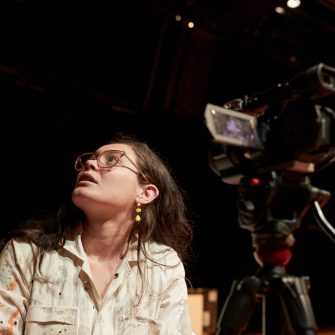Master of Educational Leadership
- Commencing Terms
- Term 1, 2 & 3
- Duration
- 1-2 years FT, 2-4 years PT
- Delivery Mode
- Face-to-face (includes blended), Online
- Campus
-
Kensington
- Codes
- Program code 8963
- CRICOS code 110654B
-
Commonwealth Supported Places are available for this program2026 Indicative CSP first year fee
- $4,500*
-
2026 Indicative CSP fee to complete degree
- $9,500*
-
2026 Indicative first year full fee
- $47,000*
-
2026 Indicative full fee to complete degree
- $98,500*

Application closures for 2026
International applications for all undergraduate programs, as well as postgraduate programs offered by the faculties of Arts, Design & Architecture, Engineering (excluding Master of Information Technology and associated programs) and Science are now closed to New Overseas Student Commencement (NOSC) for 2026 intakes.
Postgraduate programs offered by the Business School and the faculties of Law & Justice and Medicine & Health remain open. Master of Information Technology (and associated programs) also remain open.
- Overview
- Entry requirements
- What will I study?
- Future careers
- How to apply
- Fees & Scholarships
Overview
Prepare for leadership positions with the UNSW Master of Educational Leadership. This postgraduate degree provides aspiring and current educational leaders with an understanding of theory, research, and practice in educational leadership.
Gain the confidence to apply disciplinary principles and practices to complex educational environments as a school leader, principal or executive. Study the latest educational leadership theory and research at UNSW to deepen and expand your knowledge. Empower yourself with diverse practical and analytical skills for a range of educational leadership contexts.
Key features
Build on your experience
Tailor your coursework with a wide range of electives. Suit your interests and goals as an educator in diverse educational settings, whether within primary schools, secondary schools, universities, TAFE, or early childhood learning.
Incorporate new leadership abilities related to your career goals, choosing from elective course options such as leading teacher learning, educational change, or coaching and mentoring other teachers; and leading as a teacher or instructor.
Develop your specialisation
With support from a supervising academic, you’ll undertake a self-directed capstone research project. The project consolidates your new knowledge and skills and applies them to a relevant vocational issue. You’ll develop real-world experience that’s key to professional learning and your career.
Flexible study options
You can study the UNSW Master of Educational Leadership through a range of flexible options, including online and blended courses, intensive school holiday courses, self-directed learning, and evening classes.
Subsidised course fees
You may be eligible for a Commonwealth Supported Place (CSP) in this degree. The Australian Government provides a limited number of CSPs to subsidise course fees for domestic students.
Why study at UNSW?
- We’re benchmarked with the highest global rating for Education research (Excellence in Research Australia)
- Be supported by our diverse, open and inclusive Arts, Design & Architecture community
- Learn through research-informed teaching
- Benefit from strong industry links and partnerships
- Access world-class alumni connections
- Join a community that’s part of the prestigious Group of Eight (Go8) universities
Entry requirements
Depending on your experience, there are three entry pathways to the Master of Educational Leadership.
One-year fast-track program
- A four-year bachelor’s degree or combined degree in education (including professional experience or practicum) equivalent to the qualifications required for graduate teacher status in NSW or other Australian jurisdictions, OR
- A recognised bachelor’s degree and a postgraduate teaching qualification (e.g., Graduate Diploma of Education or Master of Teaching) equivalent to the qualifications required for graduate teacher status in NSW or other Australian jurisdictions, OR
- A bachelor’s degree or equivalent qualification in a relevant discipline*, plus three years of relevant professional experience and development**.
1.5-year program
- A bachelor’s degree (or equivalent qualification) in a relevant discipline* with a record of academic achievement equivalent to a UNSW credit average of 65%, OR
- A bachelor’s degree (or equivalent qualification) in any discipline with a record of academic achievement equivalent to a UNSW credit average of 65% plus three years’ relevant professional experience** and development, OR
- An honours degree or graduate diploma (or equivalent qualification) in any discipline with a record of academic achievement equivalent to a UNSW credit average of 65%.
Two-year program
- A bachelor’s degree (or equivalent qualification) in any discipline with a record of academic achievement equivalent to a UNSW credit average of 65%.
* “Relevant disciplines” may include arts, humanities, media, psychology, social work, business, economics, languages, linguistics, communications, policy studies, behavioural sciences, and social sciences.
** “Relevant professional experience” may include roles such as teacher, trainer, coach, educational developer, languages teacher, lecturer, teacher of English to speakers of other languages, educational leader, and educational administration.
Credit transfer
You can apply to have credit points from previous studies applied to the Master of Educational Leadership. The maximum credit transfer you can apply for is 50% (24 units of credit, or three courses). Recognised courses must have been completed within the last ten years, provided the content is relevant and/or meet BOSTES requirements.
Alternative entry pathways
If you don’t meet the entry requirements for the Master of Educational Leadership, you may be eligible for the Graduate Certificate in Education or the Graduate Certificate in Educational Leadership. These can provide a stepping stone to the Master of Educational Leadership.
English language requirements
You may be asked to provide evidence of your English proficiency to study at UNSW depending on your educational background and citizenship. English language skills are vitally important for coping with lectures, tutorials, assignments and examinations - this is why UNSW requires a minimum English language competency for enrolment.
If you’re completing an Australian Year 12 qualification (e.g. NSW HSC or equivalent), you do not need to provide anything extra to prove your proficiency. Your qualification will be used as evidence of your English proficiency.
If you do need to provide evidence of your English proficiency, this will be indicated in your application. You can prove this by providing evidence that you meet one or more of the following criteria:
- English language tests and university English courses
- Prior study in the medium of English
- Other qualifications
If you need to improve your English skills before you start your degree, UNSW College’s Academic English Programs are for you. The programs are suitable for various English levels and help you prepare for university studies and life in Australia.
For more details, visit the English Language Requirements page.
Depending on your experience, there are three entry pathways to the Master of Education.
1-year fast track program
- A four-year bachelor’s degree or combined degree in education, including professional experience or practicum, equivalent to the qualifications required for graduate teacher status in NSW or other Australian jurisdictions, OR
- A recognised bachelor’s degree and a postgraduate teaching qualification (e.g., Graduate Diploma of Education or Master of Teaching) equivalent to the qualifications required for graduate teacher status in NSW or other Australian jurisdictions, OR
- A bachelor’s degree or equivalent qualification in a relevant discipline*, plus three years of relevant professional experience and development**.
1.5-year program
- A bachelor’s degree (or equivalent qualification) in a relevant discipline* with a record of academic achievement equivalent to a UNSW credit average of 65%, OR
- A bachelor’s degree (or equivalent qualification) in any discipline with a record of academic achievement equivalent to a UNSW credit average of 65% plus three years’ relevant professional experience** and development, OR
- An honours degree or graduate diploma (or equivalent qualification) in any discipline with a record of academic achievement equivalent to a UNSW credit average of 65%.
2-year program
A bachelor’s degree (or equivalent qualification) in any discipline with a record of academic achievement equivalent to a UNSW credit average of 65%.
* “Relevant disciplines” may include arts, humanities, media, psychology, social work, business, economics, languages, linguistics, communications, policy studies, behavioural sciences, and social sciences.
** “Relevant professional experience” may include roles such as teacher, trainer, coach, educational developer, languages teacher, lecturer, teacher of English to speakers of other languages, educational leader, and educational administration.
Credit transfer
You can apply to have credit points from previous studies applied to the Master of Educational Leadership. The maximum credit transfer you can apply for is 50% (24 units of credit, or three courses). Recognised courses must have been completed within the last ten years, provided the content is relevant and/or meet BOSTES requirements.
Alternative entry pathways
If you don’t meet the entry requirements for the Master of Educational Leadership, you may be eligible for the Graduate Certificate in Education or the Graduate Certificate in Educational Leadership. These can provide a stepping stone to the Master of Educational Leadership.
English language requirements
You may be asked to provide evidence of your English proficiency to study at UNSW depending on whether you are from an English-speaking background or non-English speaking background. English language skills are vitally important for coping with lectures, tutorials, assignments and examinations - this is why UNSW requires a minimum English language competency for enrolment.
If English is not your first language, you’ll need to provide proof of your English proficiency before you can be given an offer to study at UNSW. You can do this by providing evidence that you meet one or more of the following criteria:
- English language tests and university English courses
- Prior study in the medium of English
- Other qualifications
If you need to improve your English skills before you start your degree, UNSW College’s Academic English Programs are for you. The programs are suitable for various English levels and help you prepare for university studies and life in Australia.
For more details, visit the English Language Requirements page.
Check the specific English language requirements for this program
What will I study?
UNSW is introducing a new academic calendar from 2028.
We are moving to a new flex-semester calendar. What does this mean for your studies?
Program structure
Depending on your experience, you can complete the Master of Educational Leadership in one, two, or 1.5 years. Below is an example of what you would study in a one-year, full-time program.
- 2 Core courses
- 2 Educational Leadership electives
- 1 Research Methodology course
- 1 Project or a Minor Thesis
- 1-2 Education electives
Full program structure
Each university year at UNSW has three terms and an optional summer study period. You can study full-time or part-time. Depending on how you plan your study load, you can fit two or three courses into a term and one course in a summer term.
Below is an example of what you could study in a standard three-term, full-time year at UNSW if you choose to undertake the single-course Project, as opposed to the Minor Thesis.
Term one
- 1 Core course
- 1 Educational Leadership elective
- 1 Research Methodology course
Term two
- 1 Core course
- 1 Research Methodology course
- 1 Project
Term two
- 1 Educational Leadership elective
- 1 Education elective
For further information on full course listing, descriptions and timetables please see the UNSW Online Handbook.
Future careers
Graduates of the UNSW Master of Educational Leadership have gained positions as principals, deputy principals, head teachers and education authorities in government departments.
The excellence of research produced by UNSW is widely recognised among our peers in Australia and beyond. In the field of education specifically, our research is benchmarked with the highest global rating of 5 by Excellence in Research for Australia (ERA), the highest possible rating and well-above world standards. The NSW Institute of Teachers also endorses all subjects and degrees taught by UNSW's School of Education.
Potential careers
- Lead education in schools from all sectors
How to apply
Applications must be submitted through our Apply Online portal. We encourage you to submit your completed application as early as possible to ensure it will be processed in time for your preferred term. Some high-demand programs and Faculties with limited places may have an earlier application deadline or commencement date. Find out more.
Ready to start your application?
For most international students, applications are submitted via our Apply Online service. We encourage you to submit your completed application as early as possible to ensure it will be processed in time for your preferred term.
Some high-demand programs with limited places, may have an earlier application deadline or may have an earlier commencement date. For details, visit the international admissions information page.
Ready to start your application?
Fees & Scholarships
There are a limited number of Commonwealth Supported Places (CSP) available for this degree/program. Your eligibility to receive a CSP will be automatically assessed when you apply. Please note that eligibility for Commonwealth Supported Places (CSPs) is competitive, with places awarded based on academic merit.
Start your postgraduate application today with our guide on how to apply.
Commonwealth Study Assistance such as Austudy, and Youth Allowance is available for some master’s degrees. For the most up-to-date information and list of degrees visit UNSW Current Student Financial Support.
*The indicative Commonwealth Supported Place (CSP) fees are an estimate based on the relevant student contribution band/s for a Commonwealth Supported Place undertaking a standard full-time load of 48 units of credit per year (1 Equivalent Full Time Student Load/1 EFTSL). To find out more about Commonwealth Supported Places visit Postgraduate Commonwealth Support.
Indicative fees are a guide only and have been calculated based on the typical enrolment patterns of students undertaking the degree/program. The indicative fee listed here is an estimate for tuition only and excludes non-tuition fees and charges. The amount you pay will vary depending on the calendar year of enrolment, the courses you select and whether your study load is more or less than 1 Equivalent Full Time Student Load (48 units of credit (UOC) per year).
You should not rely on indicative fees as fee increases are assessed when required and may exceed the indicative figures listed here. Actual fees are calculated on enrolment. More information on fees can be found at the UNSW fees website.
*Fees are subject to annual review by the University and may increase annually, with the new fees effective from the start of each calendar year. The indicative fees listed here are based on an estimated average and are for tuition only, other fees and charges are not included. The amount you pay will vary depending on the calendar year to enrol, the courses you select and whether your study load is more or less than 1 Equivalent Full Time Student Load (8 courses per year).
Indicative fees are a guide for comparison only based on current conditions and available data. You should not rely on indicative fees. More information on fees can be found at the UNSW fees website.
Indicative fees to complete the program have been calculated based on a percentage increase for every year of the program. Fee increases are assessed annually and may exceed the indicative figures listed here.
Indicative fees to complete the program include tuition plus an estimate of study-related costs of approximately $1,000 per year. To find out more about other costs, visit UNSW International.
Scholarships
At UNSW, we award over $83 million in scholarships each year. We pride ourselves on rewarding excellence and making university accessible to students from all walks of life. Whether you’re a domestic or international student, our range of scholarships, prizes and awards can support your journey.
Progress starts here – at a world-leading university

Top 20 Worldwide
Ranked in the global top 20 for three consecutive years
QS World University Rankings, 2024–2026

Winner of the AFR Most Employable University Award six years in a row
AFR Top100 Future Leaders Awards, 2020–2025

Australia's #1 for Innovation
Highest number of startups and spinouts from university-developed tech
SCOPR report, 2024
"I found that UNSW’s online courses had so much to offer. This meant that I could navigate my masters and continue my job."
Christine Castle
High School Principal




